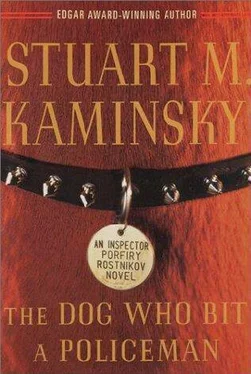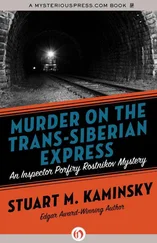Stuart Kaminsky - The Dog Who Bit a Policeman
Здесь есть возможность читать онлайн «Stuart Kaminsky - The Dog Who Bit a Policeman» весь текст электронной книги совершенно бесплатно (целиком полную версию без сокращений). В некоторых случаях можно слушать аудио, скачать через торрент в формате fb2 и присутствует краткое содержание. Жанр: Полицейский детектив, на русском языке. Описание произведения, (предисловие) а так же отзывы посетителей доступны на портале библиотеки ЛибКат.
- Название:The Dog Who Bit a Policeman
- Автор:
- Жанр:
- Год:неизвестен
- ISBN:нет данных
- Рейтинг книги:3 / 5. Голосов: 1
-
Избранное:Добавить в избранное
- Отзывы:
-
Ваша оценка:
- 60
- 1
- 2
- 3
- 4
- 5
The Dog Who Bit a Policeman: краткое содержание, описание и аннотация
Предлагаем к чтению аннотацию, описание, краткое содержание или предисловие (зависит от того, что написал сам автор книги «The Dog Who Bit a Policeman»). Если вы не нашли необходимую информацию о книге — напишите в комментариях, мы постараемся отыскать её.
The Dog Who Bit a Policeman — читать онлайн бесплатно полную книгу (весь текст) целиком
Ниже представлен текст книги, разбитый по страницам. Система сохранения места последней прочитанной страницы, позволяет с удобством читать онлайн бесплатно книгу «The Dog Who Bit a Policeman», без необходимости каждый раз заново искать на чём Вы остановились. Поставьте закладку, и сможете в любой момент перейти на страницу, на которой закончили чтение.
Интервал:
Закладка:
Little if any of this construction promised much to the vast majority of Muscovites, who still lived in crumbling, poorly constructed housing. But the people of Moscow loved their mayor, and ninety percent of those who voted, voted for him.
Sasha, even through the hangover, had to admit that since the rise of the new mayor, his salary and that of city workers, and of those employees of the government who worked in the city, had come regularly. There had even been a small raise at the start of the year.
But the noise. Just a moment of respite. A brief pause. A blessed silence.
The phone rang.
“So many places,” said the woman sitting on the spotless white sofa.
She shook her head and looked down at her folded hands. At her side, a lean young man put his arm around her and said,
“Mama, he is not worth it.”
The woman was Olga Pleshkov. She was fifty-two years old, well groomed, with stylishly cut, short gray-black hair. A dozen years earlier she had been acknowledged to be one of Moscow’s great beauties and that beauty, it was generally agreed, had been more than slightly instrumental in her husband’s political rise, a rise that came in spite of the fact that he was less than sympathetic to the existing government and had only reluctantly joined the Party, an affiliation he had been one of the first to denounce when Yeltsin mounted the steps.
Knowing the police were coming, Olga Pleshkov had worn a conservative blue summer dress instead of the jeans and cotton shirt she usually wore to work in her garden. The young man at her side was Ivan Pleshkov, thirty-one, who had taken no pains to dress for the visit. He wore a wrinkled pair of tan chinos and a loose-fitting, pullover Chicago Bulls sweatshirt with cut-off arms.
They were at the Pleshkov family dacha in Manikhino, thirty miles west of Moscow. In the 1950s, small garden plots had been given to employees at the nearby MIG fighter-plane factory. With the coming of the new Russia, those with money earned through enterprise, corruption, and bribery had begun to buy these plots, tear down the small cottages, and build large homes, which brought on the envy and anger of their far less af-fluent neighbors.
Olga Pleshkov’s statement, “so many places,” had been in answer to the question from the young policeman who sat across from her. A decade ago and with nothing on her mind, Olga Pleshkov would have attempted to “cultivate” a powerfully built and good-looking blond like this. She might still be able to accomplish it, but it would be more for the challenge than the pleasure. Now, now there was Yevgeny, his ambition-and hers-and his not-very-strange disappearance.
The question had been, “Where does your husband go when he. .?”
The unfinished question from Iosef Rostnikov was, “Where does your husband go when he goes on an alcoholic bender? ”
At Iosef ’s side, sitting awkwardly erect and not knowing what the proper behavior was in this situation, was Akardy Zelach, a hulking, stoop-shouldered, and not terribly bright member of the Office of Special Investigation. Zelach’s primary virtues were his loyalty to whomever he was assigned to work with and his willingness to do whatever was asked of him, regardless of how difficult or dangerous it might be. That willingness had, on more than one occasion, almost cost him his life. Zelach’s silent hope was that he would not be asked to do anything that required great ini-tiative, creativity, or intelligence. Zelach knew his limits, and there was no question about who was in charge of this case, though Akardy Zelach had been a policeman for almost two decades and Iosef had been one for about a year. The simple truth was that Zelach did not wish to be in charge of anything and he dreaded even the very distant possibility that he might be promoted to a position of greater responsibility.
The missing Yevgeny Pleshkov was an elected member of the Russian Congress. He was one of the most articulate and outspoken defenders of Boris Yeltsin and his policies and principles.
Pleshkov was not afraid of confrontation, verbal or physical, and generally his old-guard political enemies backed away from the huge bass-voiced man with the wild gray hair. Pleshkov was a perfect spokesman and was in great demand for television interviews and public appearances and debates.
From time to time, however, like now, Pleshkov disappeared for days or weeks, even if an important debate or vote was coming in the congress.
When the other agencies of criminal investigation had made it clear that they had pursued Pleshkov in the past and emerged with neither thanks nor great success, the Yak had instantly volunteered the Office of Special Investigation to find and deliver Pleshkov before a crucial issue on the rights of foreign investment was to be voted upon. That vote was three days from now.
Rostnikov had given the job to his son and Zelach. Though he knew of the periodic flights of the bombastic member of congress, finding him didn’t appear to be a particularly difficult assignment, though it could be a delicate one. In spite of the fact that Iosef had been a policeman for so short a time, aside from his father he was the member of the office capable of projecting the most empathy for a victim or even a criminal suspect. Part of this skill was inherited. Part of it came from Iosef ’s several years as an actor after coming out of the army. None of the empathy he displayed came from the hard lessons he’d learned from being a soldier in Afghanistan, a soldier labeled a Jew and subject to the most dangerous patrols and vindictive abuse from his superiors, who knew they were losing a senseless war fought in a terrain of rocks and soil incapable of supporting even the most simple crops.
“A list of places would be helpful,” Iosef prompted. He nodded at Zelach, who pulled out his notebook and pen, ready to take down a list.
“Places,” Olga Pleshkov repeated. “I don’t know. He could be in a hotel room. He could be. . I don’t know.”
“If someone else is paying,” Ivan said, “my father would be at any of the new bars or casinos. Jacko’s, Casino Royal, Casino Metropole, the Golden Palace, B.B. King’s, Rosie O’Grady’s, the Sports Bar, or the Up amp; Down Club. He gets there after midnight and stays till dawn. Because of who he is, someone usually takes him to a room to sleep it off during the day. My father,” Ivan went on with obvious disgust, “does not become boisterous when he drinks. If you didn’t know him, he would appear to be a quiet, dignified businessman, even a respected judge, holding court with tourists, prostitutes, and Mafia bosses who have something to gain from him. My father, in short, is a disgusting drunk.”
“Ivan,” Olga Pleshkov commanded.
“How often does this happen?” asked Iosef.
“Once or twice a year,” said Olga Pleshkov.
Her son shook his head, folded his arms, and said nothing.
Iosef addressed him. “More often?”
“Increasingly,” said Ivan, ignoring the warning looks of his mother. “Perhaps four times a year, and for longer periods. My father’s liver is a miracle of heredity and evolution. It should, by all reason, be the size of a soccer ball. And yet after each bender he manages to return to his old abusive self.”
“Your father is not abusive,” Olga Pleshkov said. “He has never laid a hand on either of us.”
“There are many ways to be abusive,” said Ivan.
Iosef didn’t bother to ask for a photograph of Yevgeny Pleshkov; his picture was frequently in the newspapers and on television. In fact, Iosef had seen the large man on a news interview television show only a week ago, and had been impressed by his ability to express himself and the apparent sincerity of his words.
Depending on how the political winds blew, Pleshkov might well have a bright future in Russian politics.
Читать дальшеИнтервал:
Закладка:
Похожие книги на «The Dog Who Bit a Policeman»
Представляем Вашему вниманию похожие книги на «The Dog Who Bit a Policeman» списком для выбора. Мы отобрали схожую по названию и смыслу литературу в надежде предоставить читателям больше вариантов отыскать новые, интересные, ещё непрочитанные произведения.
Обсуждение, отзывы о книге «The Dog Who Bit a Policeman» и просто собственные мнения читателей. Оставьте ваши комментарии, напишите, что Вы думаете о произведении, его смысле или главных героях. Укажите что конкретно понравилось, а что нет, и почему Вы так считаете.












